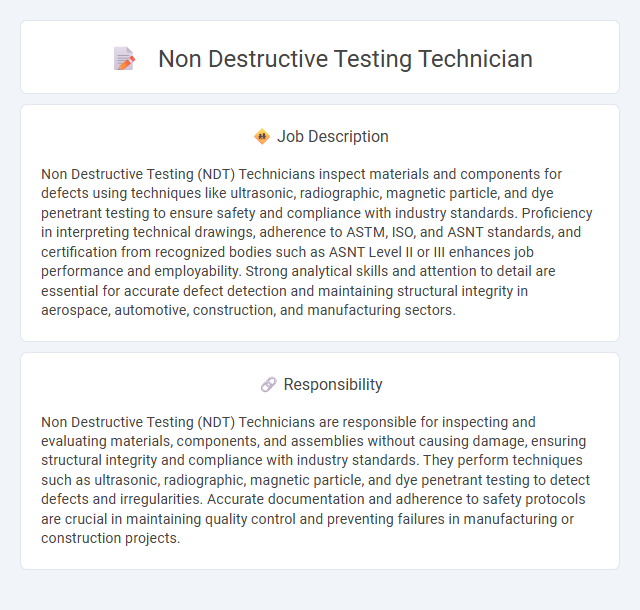
Non Destructive Testing (NDT) Technicians inspect materials and components for defects using techniques like ultrasonic, radiographic, magnetic particle, and dye penetrant testing to ensure safety and compliance with industry standards. Proficiency in interpreting technical drawings, adherence to ASTM, ISO, and ASNT standards, and certification from recognized bodies such as ASNT Level II or III enhances job performance and employability. Strong analytical skills and attention to detail are essential for accurate defect detection and maintaining structural integrity in aerospace, automotive, construction, and manufacturing sectors.
Individuals with strong attention to detail and a keen interest in quality assurance are likely to be well-suited for a Non Destructive Testing Technician role. Those who can tolerate working in various industrial environments and possess good problem-solving skills may find this job compatible with their capabilities. People comfortable with using technical equipment and following strict safety protocols probably have a higher likelihood of succeeding in this field.
Qualification
Non Destructive Testing Technicians must possess a high school diploma or equivalent, with additional certifications such as ASNT Level I or II being highly preferred. Expertise in interpreting test results from methods like ultrasonic, radiographic, magnetic particle, and dye penetrant testing is essential. Strong knowledge of industry standards and safety protocols ensures accurate inspections and compliance with regulatory requirements.
Responsibility
Non Destructive Testing (NDT) Technicians are responsible for inspecting and evaluating materials, components, and assemblies without causing damage, ensuring structural integrity and compliance with industry standards. They perform techniques such as ultrasonic, radiographic, magnetic particle, and dye penetrant testing to detect defects and irregularities. Accurate documentation and adherence to safety protocols are crucial in maintaining quality control and preventing failures in manufacturing or construction projects.
Benefit
Non Destructive Testing Technicians likely experience career benefits such as job stability due to high demand across industries like aerospace and construction. They may receive competitive salaries and opportunities for advancement as they gain specialized certifications. The role probably offers a safer work environment by detecting material flaws without causing damage, which can enhance long-term health and safety.
Challenge
Non Destructive Testing Technicians likely face complex challenges in identifying material defects without causing damage, which requires precision and specialized knowledge. The role probably demands continuous learning to keep up with evolving technologies and industry standards. Problem-solving under pressure is expected to be a common aspect of ensuring safety and quality in various industries.
Career Advancement
Non Destructive Testing Technicians can advance their careers by obtaining specialized certifications such as ASNT Level II or Level III, which increase their expertise and value to employers. Gaining proficiency in advanced techniques like ultrasonic testing, radiographic testing, or eddy current testing opens opportunities for supervisory or inspection roles in industries including aerospace, oil and gas, and manufacturing. Continuous professional development and experience in interpreting complex data lead to roles in quality assurance management or technical consultancy within the NDT field.
 kuljobs.com
kuljobs.com